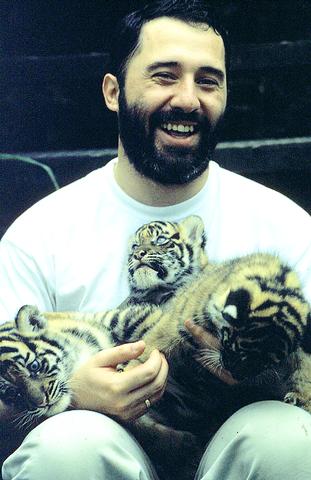Back in 1994, three little girls were upset by sight of a shop selling tigers' paws while traveling through China with their family. They wanted to do something about it. They sought the help of their father, Marco Ramero. The result: the Tiger Foundation, now a major player in wild tiger conservation.
Romero and his daughter Natasha visited Taipei last week to help launch a two-month fund-raising drive in cooperation with the 7-11 convenience store chain. For the Romeros, the Taiwan drive sets up a number of precedents that they hope will expand their effectiveness in funding valuable conservation and research work for wild tigers.

PHOTO: COURTESY OF THE TIGER FOUNDATION
"In the past, we targeted corporations or individuals," Romero said. "This is the first time we have had a retail-oriented drive. According to 7-11, two million people pass through their outlets every day, so this means that there will be two million people standing next to a donation box for the Tiger Foundation every day."
"This is the first time that 7-11 has participated in a fund-raiser for animals," said Julia Sun (
The current international exposure of the foundation is remarkable when its inception in an incident on a Romero family holiday is considered. At the same time, the Romeros' commitment to the foundation as a way of educating their children, gives the Tiger Foundation a different feel from most institutional charities.
"We had no idea what we were getting into," said Romero, throwing up his arms in mock despair. He now works full-time as the foundation's managing director. "I could never give up though," he added, saying that taking up a big thing then dropping it when things got tough was not an example he wanted to give his children.
The Tiger Foundation is still relatively small as international foundations go, but it makes up for this by getting the money to where it counts most. "We spend 97 percent of donations in the field," Romero said. "For the rest, we are totally operated by volunteers." Originally Romero had thought simply to donate money to tiger conservation, but "there were simply no organization for which we had a guarantee that the money we spent would go to actually protecting tigers, rather than the organization's overheads and such." So with C$80,000 of their own money, the Romeros established their own foundation.
The commitment to the tiger, while largely coincidental, allows the foundation to make use of the animal's potent symbolism. One of the reasons that the Romeros have taken time off to visit Taiwan is "because the tiger is such an important symbol in Chinese culture." On a more practical level, Romero said that the tiger is also an important marker of the health of an ecosystem. "The tiger is an apex predator, so to protect it means protecting whole environments."
According to Romero, 95 percent of the world's tiger population has been destroyed in the past century, and estimates now put this population at around 7,000. "This is absolutely nothing," he said. "A disease could easily wipe them out altogether. They are one of the most endangered species in the world."
Romero readily admits that his and his family's role as the creators of the tiger foundation is largely as a medium for publicity to bring the tiger's plight to a wider public. The scientific credibility of the organization is provided by people such as the organization's chairman, Ron Tilson, recognized as one of the world's foremost authorities on tigers. "We have some really good people out there," Romero said.
The fund-raising drive will run for two months. The National Geographic Channel will also be re-broadcasting some of its best tiger-related programs on Dec. 22 and Dec. 29.
More information about tigers can be found on their Web site at http://www.tigers.ca/

During the Metal Ages, prior to the arrival of the Dutch and Chinese, a great shift took place in indigenous material culture. Glass and agate beads, introduced after 400BC, completely replaced Taiwanese nephrite (jade) as the ornamental materials of choice, anthropologist Liu Jiun-Yu (劉俊昱) of the University of Washington wrote in a 2023 article. He added of the island’s modern indigenous peoples: “They are the descendants of prehistoric Formosans but have no nephrite-using cultures.” Moderns squint at that dynamic era of trade and cultural change through the mutually supporting lenses of later settler-colonialism and imperial power, which treated the indigenous as

By 1971, heroin and opium use among US troops fighting in Vietnam had reached epidemic proportions, with 42 percent of American servicemen saying they’d tried opioids at least once and around 20 percent claiming some level of addiction, according to the US Department of Defense. Though heroin use by US troops has been little discussed in the context of Taiwan, these and other drugs — produced in part by rogue Chinese Nationalist Party (KMT) armies then in Thailand and Myanmar — also spread to US military bases on the island, where soldiers were often stoned or high. American military policeman

An attempt to promote friendship between Japan and countries in Africa has transformed into a xenophobic row about migration after inaccurate media reports suggested the scheme would lead to a “flood of immigrants.” The controversy erupted after the Japan International Cooperation Agency, or JICA, said this month it had designated four Japanese cities as “Africa hometowns” for partner countries in Africa: Mozambique, Nigeria, Ghana and Tanzania. The program, announced at the end of an international conference on African development in Yokohama, will involve personnel exchanges and events to foster closer ties between the four regional Japanese cities — Imabari, Kisarazu, Sanjo and

A town in Japan is to urge all residents to restrict their smartphone use to two hours a day in an attempt to tackle online addiction and sleep deprivation. Officials in Toyoake, Aichi prefecture, said the measure would target not only children but also adults, amid growing concern about the physical and psychological toll excessive smartphone use is taking on people of all ages. The move aims “to prevent excessive use of devices causing physical and mental health issues … including sleep problems,” the mayor, Masafumi Koki said recently. The Toyoake municipal assembly began debating the non-binding ordinance this week ahead of a